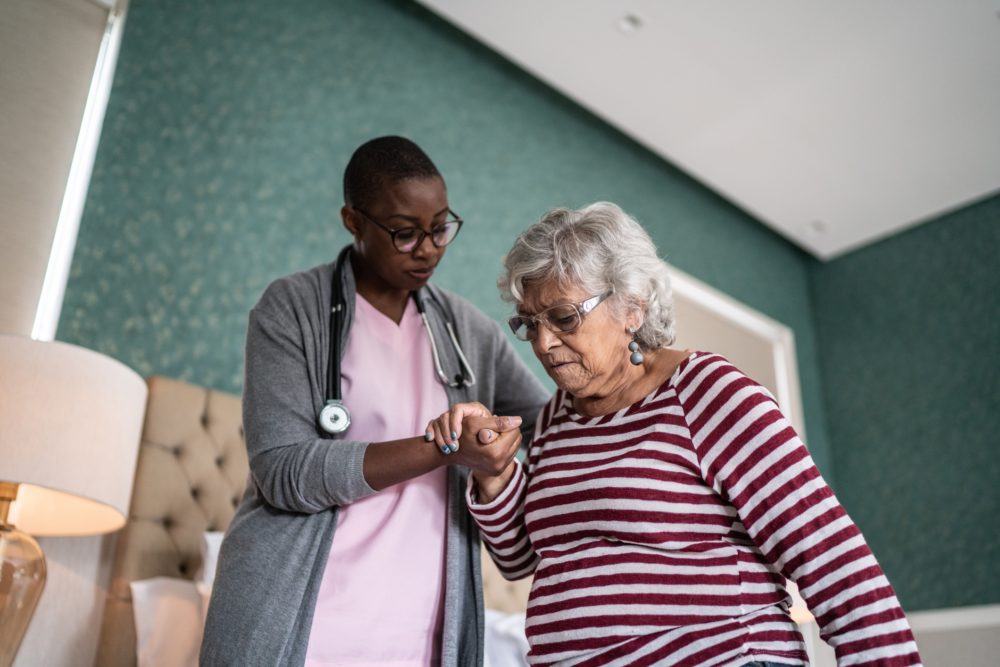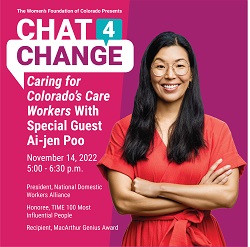
Who’s Caring for Colorado’s Care Workers?
Colorado’s care workforce is underinvested in and undervalued

We [women] are the majority of the population, majority of the electorate, majority of the workforce… and yet we’re still doing majority of family unpaid or low paid labor. And we live longer. Our stuff is not ‘special interest’ stuff. Our stuff is the stuff of the future, of the whole. – Ai-jen Poo, president of the National Domestic Workers Association, TIME 100 Most Influential People, MacArthur Genius Award Recipient
Getting Paid In Hugs, Going Without Benefits
“You get paid in hugs.” So goes the saying at early childhood centers.
Hugs are great. But they don’t pay anyone’s bills.
The two work forces called the care workforce – early care and education and home care or direct care – are built on the assumption that educators and caregivers do this work out of the goodness of their hearts, and thus don’t need a living wage or benefits. Unfortunately these assumptions have resulted in the U.S. grossly underinvesting and undervaluing the critical role of care workers.
“Home care is what people call women’s work… That narrative has really hurt the work of home care. It’s work for low wages and low benefits and not much respect,” explained Melissa Benjamin of Colorado Care Workers Unite (CCWU).
CCWU, founded in 2018 by 22 care workers including Melissa Benjamin, works to make care jobs good jobs in Colorado. The organization created a bill of rights designed to lift up, restructure, and embed dignity in care work, advocating for guaranteed livable wages and benefits, workplaces free from harm, and a say in the decisions that affect their workplaces and livelihood.
“There’s a history of people expecting women, especially minority women, to take care of them,” said Kasondra Mathews, who worked in home care for over 21 years. Though she dedicated her life to helping others and sees it as her calling, Kasondra had to leave the field because low pay and lack of benefits made it impossible to pay her bills, even when working 16-hour days. She now uses her skills and gifts for slightly better pay caring for people in a hospital setting.
Colorado’s Direct Care Workforce Is Insufficient to Meet the Needs of Today’s Older Adults
Care worker is a rapidly growing field, in Colorado and nationwide. In a few years, an estimated 7.8 million jobs in the direct care field, like nursing aides and home care workers, will have no one to fill them. According to The Bell Policy Center, a WFCO grantee, in order to simply keep pace with our demographic changes, by 2030, Colorado will need to grow our direct care workforce by 40%.
In 2020, the Colorado Health Institute released its Closing the Care Gap report, which found:
- Nearly 60,000 direct care workers provide services such as cooking, bathing, or medication administration to older adults in Colorado each day.
- Over 80% of direct care workers in Colorado – the term for nursing assistants, home health aides, and others who provide care for older adults or individuals living with disabilities who need support inside their homes or in nursing facilities – are women. Women of color makeup 44% of the workforce.
- Colorado has over 920 home healthcare agencies employing these workers, and workers have a scattered patchwork of wages, benefits, and access to support and training. It’s a disjointed puzzle of care rather than a unified system, and care workers bear the burden.
- In Colorado, 44% of direct care workers live below 200% of the federal poverty level, earning less than $36,000 if in a two-person household. Care workers rarely have access to affordable benefits for themselves.
Child care, an industry that enables parents to stay in the workforce, is also under stress: Over 100,000 workers have left early care and education since the start of the pandemic.
- UC Berkley’s Center for the Study of Child Care Employment reports, “Colorado early educators with a bachelor’s degree are paid 26.5% less than their colleagues in the K-8 system. The poverty rate for early educators in Colorado is 15.1%.
The Care Workers Coloradans Rely Upon Deserve Better Pay, Benefits, and Dignity
It’s challenging to recruit and retain care workers, due to low wages and the lack of benefits. Work is oftentimes physically and emotionally draining, and many care workers have left for better-paying positions in retail or food service.
Our care systems are under strain, and the individuals who perform this oftentimes physically and emotionally draining work are struggling. The pressure the COVID-19 pandemic placed on essential workers combined with skyrocketing housing prices pushed many underpaid workers into homelessness – including some CCWU board members and organizers.
“We have a 60-year-old care worker who’s been living in a church basement for a year,” Melissa noted. “She doesn’t have a car so takes the bus for hours to get to and from work. Another worker has been living in his car. We see a lot of housing and food insecurity. Care workers love the work we do, and we love our clients, too. But how are you going to care for someone, feed them, and help them dress when you don’t get paid enough to have a home of your own to go to?”
Those who care for our beloved family members and help Coloradans when we most need it need support, too. To keep workers in these important roles and to find new workers, Colorado needs to change how we compensate care workers, and honor the crucial work they do every day.
“Care work is something that’s needed and it isn’t going anywhere,” said Kasondra, noting that while pay has evolved over the years in traditionally male-dominated industries included skilled construction trades, it hasn’t kept pace for care work. The care workers Coloradans rely upon deserve better pay, benefits, and dignity.
Join Us for A Special Chat4Change Featuring Ai-jen Poo, president of National Domestic Workers Alliance, on November 14
Join The Women’s Foundation of Colorado to learn more about the critical role care workers play in Colorado, and how you can advocate for policies that promote dignity and a living wage for care workers. On November 14, 2022, WFCO will host a virtual community conversation, Chat4Change: Who’s Caring for Colorado’s Care Workers?, featuring Ai-jen Poo, president of the National Domestic Workers Alliance, TIME 100 Most influential People honoree, and MacArthur Genius Award recipient. Ai-jen Poo will share what’s happening nationally for care workers. Local leaders, including The Bell Policy Center, Colorado Care Workers Unite, and the Senior Hub, will share their perspectives and plans for increasing investments in these essential workers who hold up our economy.
Register for the November 14 event here.

